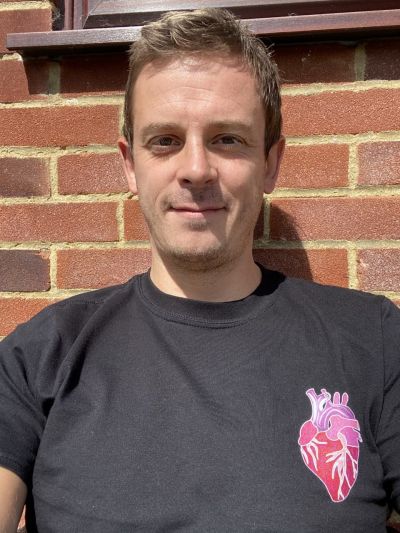
Phill Read
Friday 5th February 2021
Phill Read, 43, was diagnosed with moderate mitral valve disease in February 2020. A Partnerships Manager for an over 60s property specialist and an avid cyclist, Phill and his wife Sacha have researched different treatment options and discussed them with his clinician to ensure they make the right decision for themselves, their children Cameron, 22, Yasmin, 18, Sadie, 8, and, of course, the family dog, Harry.
"Back in October 2018, I collapsed at home, and an ambulance was called. After a few ECG's, it was put down to a one-off incident, and no further action was taken. Just over a year later, in November 2019, I had a more severe episode where I collapsed again after experiencing shortness of breath, an increase in my heart rate, and overheating. I was in the cardio ward at Worthing for 3 days whilst lots of tests were done, where the Angiogram came back as normal.
As I did not fit the usual patient profile (I was only 42), I was a bit of a mystery!
I was booked in for another echogram a year later. After seeking a second opinion in February 2020, they confirmed that I had a heart murmur and that I was suffering from moderate mitral valve regurgitation. Some additional tests were booked in, and I was referred back to the NHS.
Then Covid arrived!!
I eventually had a TOE completed in October 2020. The regurgitation had deteriorated from mild to moderate, and from moderate to severe, and I was referred to Mr Ishtiaq Ahmed at Brighton hospital. I was then diagnosed with Barlow's heart valve disease of the mitral valve.
Then just before Christmas, I suffered a third episode and collapsed again. More tests were completed, and it was decided I needed surgery later this year to repair the valve.
As it happened over a more extended period (1 year plus), I did have time to accept the situation and research what I was experiencing.
My wife and I have spent a lot of time on the BHF website, Heart Valve Voice's website, and watched many videos on youtube regarding the different types of treatments and operations possible. This knowledge for me is vital, as it means I not only understand my condition better, but I also understand the challenges that my surgeon and the cardiac doctor will be facing over the coming months as well.
We have looked at the different heart valve options, and Heart Valve Voice's videos on youtube have helped show us what to expect in the future.
I hope my valve will be repaired, but I have been looking at other valve options. The main factors that I have discovered so far are concerns over the noise from the mechanical valve, the need to go on long-term/lifelong medication, and the tissue valve's potentially limited lifespan. These all need careful consideration, and I will be working with my surgeon on deciding on the best option.
Personally, though, the main factors to consider when picking what treatment is right for me are the size of the scar, the length of recovery time, and what impact each option could have on my ability to return to work and family commitments as quickly as possible.
Work is a significant factor here. I will be based at home, and they have been very supportive from day one. I will work with my employer and HR department to have a plan in place that aids my recovery and enables me to contribute to the business as soon as is possible.
COVID has and will be a huge factor during this process. When I was admitted to the hospital before Christmas, I had to walk into the ambulance on my own, and that was quite daunting, to be honest. I wanted my wife to be there for her support. But the staff at Worthing hospital were excellent and did everything to make me feel safe and comfortable.
COVID has also led to communication delays regarding receiving my notes after my consultation, so things are moving at a slower pace, which can be frustrating. But I understand I am not alone in this feeling, and that my clinicians are doing all they can to help me and everyone else affected by the pandemic.
Overall, I feel very positive about my current situation. I can carry on my daily life as normal, with some small adjustments and changes, such as being on medication. I am becoming more informed each week, and despite the COVID situation causing some concern over when the surgery will happen, I know I am not the only one in this situation, and I trust in my clinicians and local services.
I feel very positive as I know what I have. I know that it can and will be fixed, and I know I have the support of my wife, children, clinician, and work. I feel ready to make a decision that is right for me when the time comes."


